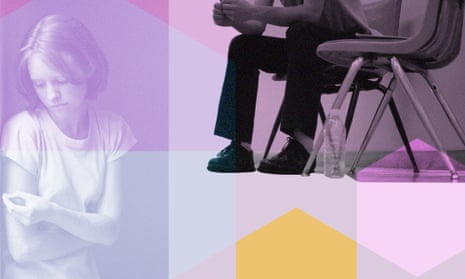New figures show in June that nearly a quarter of a million children and young people were in contact with mental health services for problems such as anxiety, depression and eating disorders.
The NHS data highlights the scale of the growing crisis in young people’s mental health. But what help is there for those who need it? Research shows 28% of children referred for support in England – including some who had attempted suicide – received no help in 2015.
We asked for your experiences of children’s mental health services in England, receiving responses from parents, teachers and young people themselves. Here are some excerpts from the comments we received, condensed and edited for clarity.
Beth Ackers, 18, Merseyside

I went to the doctor last year because I was feeling depressed and anxious. I was nervous about going to see my GP as I wasn’t sure what was wrong with me. My mum came with me and I think she did most, if not all, of the talking. I was just too emotional and worked-up to speak properly.
I was immediately referred to child and adolescent medical health services [CAMHS] and an assessment appointment was set up. After this, I was told I would only have to wait six weeks, but when I hadn’t heard anything by 12 weeks I was told that they would need to do the initial assessment again. I was then referred to cognitive behavioural therapy and given six sessions. However, when I got to the end of these sessions they said that I actually needed different treatment. The person who saw me felt that my issues were more ingrained and talking to a counsellor or therapist might be more appropriate. I was told this at the beginning of June and still haven’t got an appointment to talk with someone. Since then, I’ve turned 18 and am not sure how this will affect my treatment. The whole experience has made me feel quite isolated and abandoned. It took a lot to talk about how I was feeling, and now I feel like I am being ignored. I also found the service quite disorganised, and doing the assessment again was stressful. I cannot afford to get private counselling and am just hoping that I was will be offered someone to talk to at my university when I start soon.
Azia, 17, West Yorkshire
I went to see my GP in 2014 about anxiety and depression. I had been feeling hopeless and helpless, tearful, with no motivation or interest in doing anything. I was not getting any enjoyment out of life and had suicidal thoughts. From around the age of 13, I also experienced anxiety. The physical symptoms were headaches, soreness in my limbs, bloatedness (and with that increased trips to the toilet), sweats and shivers, loss of libido and increased sleeping.
My doctor recommended that I get help from a local mental health charity called The Market Place before considering children’s and adolescent’s mental health services. The counselling was not helpful, so I went back to my GP who referred me to CAMHS.
My assessment happened within three to five months and I was given a case manager and began family therapy soon after. We soon discovered that it wasn’t the right therapy for me and so I began mindfulness-based cognitive therapy (MBCT) a month later.
I am currently undergoing cognitive behavioural therapy (CBT), which I am finding very helpful. The waiting period for this therapy was over six months however, which was very frustrating. Having said that, I could still contact my case manager if I needed to, and she was always very helpful.
Overall I have had few problems with CAMHS and all the medical professionals I have come into contact with are excellent. They are superb listeners and have always asked me what I felt was best for me as well as giving their professional opinion. Many people slate CAMHS without appreciating the good they do and the lack of control they have over certain areas, such as waiting periods.
The waiting period I endured for CBT was rather long and it allowed my problems to get worse. However I am reluctant to criticise CAMHS for this because if they were given adequate funding from the government this wouldn’t be a problem.
Rose Grace, 24, Manchester

I was 14 when I was diagnosed with anorexia. Having an eating disorder was one of the worst experiences of my life, a situation made worse by children’s mental health services. Firstly, the therapist I was assigned to made me feel uncomfortable; it felt like he was blaming my parents for my situation and I didn’t feel I was being listened to. I ended up working out for myself what was causing my eating disorder.
Eventually, my condition got worse and I was admitted to hospital as an inpatient. However, I wasn’t admitted as a patient in a specialist unit for eating disorders and the staff didn’t seem to have any experience treating people with conditions such as my own. They made me feel I had brought this all on myself. A few weeks later I left hospital and despite being physically better, I was psychologically worse. It was only because of my parents that my condition improved over the next few years. They spoke to another therapist who helped them understand how to help me. The biggest step forward was talking about my anorexia differently and viewing it as a negative voice separate from me. My parents then would say to me, “I know that this is not you, it’s your anorexia” and I would realise they were right. Being able to visualise it that way helped me to beat it.
Leo Winkley, 45, headteacher, York

This is a really important issue for schools – the simple fact is that we are having to plug the gaps in provision and cover the ridiculous waiting times for children to be seen in a massively overstretched and under-resourced CAMHS. Solutions that we have put in place include training teachers in mental health first aid, employing a team of counsellors for drop-in sessions and developing a more proactive mental health and wellbeing course within our personal, social, health and economic programme. We are very lucky to have the resources to do this. There needs to be investment to allow schools to equip teachers better; whether we like it or not, teachers will be in the frontline on the critical issue of children’s mental health.
There are times when a school really needs to refer a child on to experts. This is where the real problems lie – the lengthy delays. With an under-resourced CAMHS, the management response seems to be to make the referral thresholds higher and higher. In this situation, the school can only put its own support, monitoring and reporting measures in place and put all reasonable pressure on the local CAMHS provider. It’s very important that pastoral care in a school doesn’t desensitise the public to these issues and only deals with the most acute or chronic cases. Early and sensitive intervention can make a big difference.
Anonymous, 17, London
Initially, I went to the doctor for my low and high moods, including hallucinations, delusions and suicidal thoughts. Going to the GP was daunting, but I found the doctor empathetic and professional. She called CAMHs and the reply was instant. I was contacted the next day and asked to come in the day after. Everything happened swiftly. I met a family therapist for my first session in which I gave information about my symptoms and what had happened to me. My next session was with a psychiatrist whom I then started to meet weekly, even though I was reluctant to talk. My psychiatrist was very helpful and compassionate, and seemed to care about me as a client. I regularly attended sessions in which we would discuss techniques and strategies, go through my thought processes in trying circumstances and discuss what was important to me. I was made to feel comfortable and secure, and never judged. I was very satisfied with how things were going. However, I do understand that friends who have gone through CAMHS have not been as lucky. I was told in all of my sessions where I could go for help, who I could talk to and I was given all the support I needed.
I am still attending my fortnightly sessions. I have not yet received any medication, as they did want to put me on anti-depressants. However, they were worried about the potential increase of suicidal thoughts. They also wanted to put me on anti-psychotic medication, but, were reluctant because of my age. I have not received a diagnosis, but they are still investigating.
Anonymous, 51, Buckinghamshire
My children have had ongoing mental health issues and have received support from our local CAMHS over the years. However, local services have deteriorated significantly over the past five years.
My youngest child has had repeated referrals to CAMHS over the last two years by their school and GP for their deteriorating mental health difficulties. On every occasion we were told they didn’t meet the threshold for therapeutic help even though they were self-harming, threatening to kill themselves and having increasingly dangerous angry outbursts requiring police interventions.
In desperation, I insisted that my youngest be referred to a specialist hospital team for a second opinion. Their diagnosis was early bipolar syndrome. They prescribed medication to help and my child was referred back to local CAMHS for ongoing care.
Sadly, my child made another attempt on her life which required hospitalisation as an inpatient. After a seven-day wait at home, the only bed available was more than 300 miles away from our home. My child has been resident there for more than two months and no bed closer to home has become available.
Having my child sent so far away has left me feeling helpless and unable to support her as much as I would like. Communication has been very difficult both with my child and the hospital staff and I have found myself constantly having to chase for information and to reassure my child. Visiting has been restricted to weekends; it’s a five-hour drive from where we live.
Initially we were told the mental heath services would continue to seek out a bed closer to home but that has not materialised. My child was initially relieved to have had a bed located but upset that it was so far away. They miss their home comforts, our pets and family. These things have, I feel, added to everyone’s distress.
We are still waiting for local CAMHS to share their support plan for when my child returns home. Our local CAMHS does not offer family therapy such as art therapy, owing to cuts.
James Downs, 27, Cardiff

I was a high-achieving young boy and at 14 I developed obsessive compulsive disorder (OCD) and anxiety about my appearance. It got to the point that it would take me ages to get ready and I kept skipping school without telling anyone why. After a year of doing this, I told my parents and the school the reasons behind my truancy and was eventually referred to children’s mental health services. I was seen quickly but the quality of treatment wasn’t very good. I felt like they wanted to treat me for OCD without talking about any deeper issues going on. I was offered help but soon my OCD changed into an eating disorder and I became anorexic. I didn’t feel they were working with me to improve my health, but that they felt I was badly behaved. The whole focus was just on, “You must gain weight” rather than them asking, “What’s going on to make you feel this way?” Eventually I gained weight and was given a lot of medication (anti-depressants etc) which I wasn’t happy with. I was offered care in my community and sent home, with a team around me to help. I gained weight but developed bulimia and no one seemed to care about this, so I just stopped talking to people about it. I am still working through my issues with food and cannot help but feel that my life might have been different if these issues had been properly dealt with when I was younger.
I know there are more specialist services in place for treating eating disorders now, but I also know there are cuts to CAMHs and what’s on offer is quite patchy. This makes me worry for other young people as I don’t want them to go through what I did.
Tracey Lawrence, 31, assistant head, Leicestershire

Mental health is everybody’s business. The government needs to invest more so that we, as classroom teachers, receive proper training to deal with these issues and have the support in place when exploring the best way to move forward with a child. There’s a fear of delving into mental health because of a lack of knowledge – that’s why teachers need a clear structure for support. It’s an issue the government says it cares about, but at the moment it isn’t doing very much.
The waiting time for CAMHS is not a hidden issue. You hear report after report about the impossibility of having a child referred and the lack of help when you get there. There is pressure for teachers to plug the hole left by a lack of services. We are constantly trying, without qualified knowledge, to help children and what we can offer depends on school funds and whether we can get specialist help, such as a counsellor on site. The CAMHS professional helpline is my biggest support. I’ve had many a conversation about children who I knew didn’t meet the threshold for referral but still needed help. The people on the lines are always supportive, never laugh when I say for the millionth “Sorry to bother you, but ...” and “I hope I’m not wasting your time, but ...” and they certainly always have a way forward in terms of strategies to implement and interventions to support a child. However, this usually isn’t enough and the children really need one-to-one professional help as soon as possible. We need to have a real focus on what the different branches of mental health are, how to identify them, where to go for support when you don’t meet the criteria for diagnostic assessment and examples of interventions to implement for each problem area.
Stacey Hirons, 42, work in crisis intervention, Coventry

I work for Coventry’s crisis intervention service, supporting young people aged 11 to 18 (although often we have younger referrals, too). In my experience CAMHS is a service under immense pressure with substantial waiting times. When support does come it can change crisis situations overnight. Frustratingly, this is the exception. We are also often told CAMHS cannot work with a child until their home situation is settled, but mental health issues put enormous stresses on families, meaning the situations are unlikely to be resolved without CAMHS support. It’s a vicious circle. One other bugbear is that CAMHS are not able to visit families at home and see the young people in their real-life contexts. This is especially difficult for our service: a young person who is too anxious, aggressive or violent to attend school and/or be out in the community is hardly going to want to come to hospital appointments. In my experience, sometimes there are delays and sometimes the service is brilliant at responding. What is really needed is investment from central government, and work done to create a positive message about the importance of mental wellbeing.
Stuart Hannah, child and adolescent psychotherapist, Leeds

I have worked in different child and adolescent mental health services in London and the south-east as well as the Yorkshire region since 2003, when I left social care to specialise in child mental health. The work is interesting and varied in as much as you never really know what stories people have to tell about their lives and what will unfold in the consulting room.
However, the work is undertaken in a context of perpetual change and economic uncertainty. Every service I have been in has suffered from collective low morale and very high levels of uncertainty about the future. To a degree, a traumatised workforce is trying to work with a traumatised population and this is a worrying cocktail.
Parents often arrive thinking there is something wrong with their child and expect you to make them better immediately. As stories unfold, it usually emerges that difficulties are collectively located in all family members to varying degrees, as well as the parental couple relationship, formative experiences in early childhood and the modus operandi of the parents.
I wonder whether CAMHS should be completely rethought and stripped back to basics. I am partly reassured by the Future in Mind agenda and some of the local transformation plans. The emphasis on multi-agency collaboration makes good sense as does matching service provision closely to local need, identified via robust data collection.
However, the collective wellbeing of children and families in our society directly correlates with economic and social realities and their impact on how people, particularly parents, feel. Now more than ever we need to encourage empathy in all human relationships, and in communities underpinned by core values of respect, compassion, tolerance and equal opportunities for all. Properly funded and creatively delivered, CAMHS can make an active contribution to empathy development in individuals, families and organisations, but it needs to be thought of as part of a broader picture of how we want our society to look in a decade’s time.
Anonymous, Herefordshire
When my daughter was 10, she struggled with the fact that her father had decided he no longer wanted contact. This really knocked her for six. She became angry and tearful. She’d come home and scream and hit her pillow. She’d burst into tears at random times. Her work at school suffered. I went to the GP and explained the problems and asked for counselling. He said her school should provide help for this. Her primary school had nothing they could offer so I asked for help through the NHS. She was referred to CAMHS but they sent a letter back explaining that they couldn’t help as she didn’t meet the criteria. I looked into private treatment, but as a single parent I couldn’t afford private counselling at £40 a session.
When my daughter reached secondary school, they were far more helpful and provided weekly counselling sessions for a year and a half. My daughter is now doing much better at school and is no longer angry any more. She understands that the situation is not her fault. If it hadn’t been for her secondary school I’m not sure what state she would be in now.
There appears to be no help for children experiencing mental health issues unless they’ve reached a point of self-harm. CAMHS need to intervene at an early stage to prevent further harm. In my experience, as an adult you can walk into a GP surgery and come out with a referral for six sessions of therapy. This facility doesn’t seem to exist for children.
Anonymous, 24
I was looked after by children’s mental health services from the age of 13 to 18. I went to see my GP at the age of 12 because of depression due to bullying. I didn’t know what to do and, when I went to see them, my parents didn’t know what to do. My school was terrible, really unhelpful. My doctor explained that there was a long waiting list to be seen and it was during this wait that I tried to kill myself. In fact, one of the only negatives of my experience was the long waiting time to get help. I understand it’s even worse now, which is worrying.
After I made an attempt on my life, I was seen straight away and the care I received from that point was excellent. There’s no doubt in my mind that the nurses and doctors who cared for me saved my life. I always felt supported and listened to. The nurses always wanted to help me. Even though it’s their job to listen, it felt like they really cared. Also, because I was 13, it would have been easy for those looking after me to just say, “We know what is best for you,” but they always took my opinion on board. They listened to my feelings.
I saw a range of psychiatrists and counsellors over the years, and was diagnosed with a variety of conditions including anxiety and agoraphobia (a fear of being in public places). I had my ups and downs, but steadily got better during my time with them. I never tried to kill myself again.
I do feel that the transition to adult mental health services is difficult. It felt strange that as soon as I turned 18 I could not be seen any more unless I went somewhere else. This felt really scary, and it would be good if there were more support in place or if the transition was slower and more gradual.
Anonymous, children’s mental health services
I work in CAMHS and we are massively underfunded. As well as this a lot of third-sector organisations that used to look after young people’s wellbeing have been cut or shut, which means we cannot refer people elsewhere if they don’t meet our threshold. I have been working with CAMHS for many years in a range of different areas. The biggest challenge is demand v capacity. There’s massive expectations on staff to deliver but with very limited resources. That’s one of the biggest frustrations because we are here to help young people and sometimes feel we simply cannot do our job. It feels like the NHS is being slowly deconstructed and staff morale is so low.
We do sometimes have to turn people away we should see because we get so many referrals, and this means the threshold for who we can help keeps changing. What we can now deliver is care for those in acute need. There are now a lot of young people who are left to struggle until it gets to the point of acute crisis. They don’t receive help early enough.
From a staff perspective, we feel frustrated and under a great deal of pressure. The systems we use are slow, clunky and inefficient. CAMHS does care about young people and does want to provide the best service, but people’s expectations are unrealistic as they don’t understand the stress we are under. It’s not that we are not interested or not working hard enough, we simply don’t have the capacity.
Abby, 19, west Sussex
I first sought help about three months before my 18th birthday, but because of my age CAMHS refused to see me. They said that by the time my referral was processed I would be an adult. The first – and only – time I saw a CAMHS worker was in hospital after I’d tried to kill myself two weeks before my birthday.
There should be something in place to help people who are not quite old enough for adult services, but deemed too young for children’s ones. For example, if someone was 17 and a half years-old at the time of their first assessment, they could be referred to adult services instead of CAMHS. I think this would prevent people like me from falling through the net.
Now I am an adult, I have a wonderful GP who is hugely supportive and proactive in fighting my corner and making sure I get the help I need.
Tina McGuff, 46, Dundee

I work in finance but do mental health support voluntarily after setting up my own charity. My charity is for young people and I help families try to access services. I also give talks about my experiences with mental illness in schools and universities to raise awareness and break the stigma. I want to help children get seen before they reach crisis point.
When I was younger, I was sectioned under the Mental Health Act with anorexia and I nearly died. I also ended up having a psychotic episode in my 20s and suffered from orthorexia until my mid 30s. I am now fully recovered and have published a book about how we have to help each other and lift the lid on these problems.
I visit parents who need advice in helping their children, offering them support and a shoulder to cry on. I also try to put them in touch with other experts who might be able to help. The most common problem they have is not being able to get an appointment with CAMHS quickly. In one instance a girl tried to kill herself in January but wasn’t seen until June. That is just unacceptable.
We need ring-fenced resourced money to fund mental health services in this country and more support in schools. I talk in schools and this can make a huge difference. Often kids will come and talk to me afterwards and tell me about their own issues. The school can jump in and help that individual. Early intervention is key and if we as a society can talk about mental health openly then it will help save lives.
Anonymous, 39, North Yorkshire
My son is 14 and was referred to CAMHS last year with anxiety and intrusive thoughts. His issues gradually appeared – it started with him having nightmares, and then he got upset over minor things. Soon it developed into daily panic attacks at school. These issues came after a particularly difficult year with seven deaths in the family and a divorce between myself and his father. We also moved four times in six months, so this could have contributed to his stress.
We went to the doctor and they immediately referred him, but it was eight weeks before he was assessed. In this time, he was offered no support and I was surprised by how long it took. Luckily, he didn’t decline too much during this period, but it was still a battle to get to school, and he worked out that if he said he was sick then he would be sent home.
After his assessment, he was seen once a week and offered cognitive behaviour therapy as well as mindfulness techniques etc. It has really improved his anxiety but he still suffers from intrusive thoughts. He believes he is worthless, a burden and that everyone hates him. This aspect isn’t really being dealt with and now it’s time for him to be discharged. He has been told essentially that he has a certain amount of time to recover and if that doesn’t happen then tough. He will leave the service without some issues being appropriately handled.
Anonymous worker, mental health social worker
One of the issues is the lack of hospital beds and specialist units. Often the situation you get is that on a national scale, children will be shifted around the country because there aren’t enough beds on a local level. Where I work, for example, children end up far away from their family after assessment. I recently saw a child who was placed miles away and they were detained in hospital for their own protection, against their will. They spent nearly a month away from home and then stayed in hospital for treatment. These children are isolated from their families, from services and professionals local to where they live. He was away from school and friends in a little private hospital. It wasn’t even an NHS bed – and it’s not uncommon for the NHS to pay private hospitals in this way.
I see this happen often. This year, in terms of the assessments I’ve made on children, it’s happened a lot. It hinders recovery because young people need to be in a local hospital, where they have local community teams feeding in. They also need to be discharged as soon as possible to maintain a normal school and family life.
Kerry-Mae Doogan, 21, Wigan

I was first referred to CAMHS aged 14 by my family GP. At the time there was a waiting list of up to a year for help, and in the end I waited for more than seven months to be assessed. Once I was seen by CAMHS I was moved between workers and my regular appointments were often cancelled without warning. In the end I discharged myself from the service because it was doing me more harm than good. Instead I went to a local charity counselling service which I found much more helpful.
I experienced delays before and after the initial assessment. In that time my health got worse, although I was fortunate I was able to cope during this period.
My experience would have been improved by not being shuffled between various workers who made me repeat my background information over and over again.
I have been in recovery for two years now and I no longer use medication or have much contact with mental health services. When I was 18, I got involved with the Royal College of Psychiatrists as a young adviser to their quality networks for inpatient and community CAMHS. I am working with them to improve standards of child mental health services. I don’t want other children to be let down the way I was.
Natalie Milner, 22, Leeds

I had panic attacks during school several times before I finally asked my mum to help me. We made an appointment with the doctor about one or two months after the first attack.
The doctor seemed convinced I thought the attacks were heart attacks, which she brushed off, by saying: “You know you didn’t have a heart attack don’t you?” I never mentioned a heart attack – I didn’t know what was going on with my body. She suggested next time it happened to just carry a paper bag around with me and ventilate into it. She never told me what a panic attack was and never gave any thought to me having anxiety issues.
My mum eventually pushed for a referral and, after a six-month wait, I received cognitive behavioural therapy through CAMHs. I continued to have panic attacks more and more frequently during the waiting period. I remember it making me feel scared to be in public and made me more and more isolated from my friends. No one really understood what I was going through. I once had a panic attack in front of my best friend and she said, “Oh please don’t”. I didn’t have help or a diagnosis, so to everyone else it seemed like I was acting out.
I feel my age was definitely the reason why I wasn’t taken seriously. I felt like they all thought, “What do you have to worry about – you’re just at school”. Everyone believed it was all my control and that I could choose not to have panic attacks and choose not to be depressed. My mum wouldn’t let me tell my grandparents as she didn’t think they’d understand.
I remember asking adults, teachers and my doctor every week and I never got the answer to what this was (a panic disorder). I found out what a panic attack was on the internet late at night and finally it all made sense. I can now control my panic attacks if they resurface thanks to the help of the CBT I had when I was a child. I just wish I had been taken more seriously from the start.
Anonymous, 47, Monmouthshire
Last year, my child, who had been having suicidal thoughts for at least two years, was diagnosed with severe depression and anxiety disorder. She was 15 at the time.
We were lucky she had enough of a self-preservation instinct to see a school counsellor who got her to see the GP. We were told there was at least a nine-month wait to be treated by the CAMHS in south Wales. Even though she was feeling suicidal, because she hadn’t actually self-harmed she wasn’t enough of a high-risk patient to make her a priority, so she had to wait. During this time I watched my compassionate, funny, lovely daughter disappear before my eyes. She became angry, sad, lonely and despairing. Her social life was non-existent and her grades got worse as her anxiety grew. She was referred to a private psychologist who saw her for seven months twice a month. It cost a fortune, but we had no choice.
Gradually she improved but the psychologist thought medication would be useful. In order to get this prescribed she had to see a consultant psychiatrist, which happened within six weeks of a second referral to CAMHS.
Since then she’s been on a low dose of medication and has agreed to do some group therapy to deal with her anxiety. CAMHS and the NHS have been great now she’s in the system, but I don’t want to think what would have happened if we hadn’t got her help privately in the long wait to be seen. During that wait she has battled with her feelings of despair and studied for GCSEs. It was an incredibly stressful time for her.
Our experience would have been greatly improved if she’d been referred more quickly. By the time a child asks for help they are already quite unwell. Initial help needs to come within a couple of weeks. It’s very hard to ask for help and the longer mental health issues go on, the harder they are to resolve.
- In the UK and Ireland the Samaritans can be contacted on 116 123. In the US, the National Suicide Prevention Hotline is 1-800-273-8255. In Australia, the crisis support service Lifeline is on 13 11 14. Hotlines in other countries can be found here.









